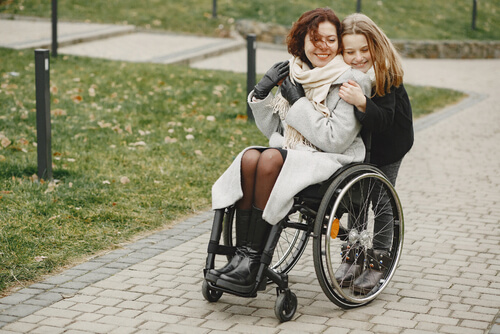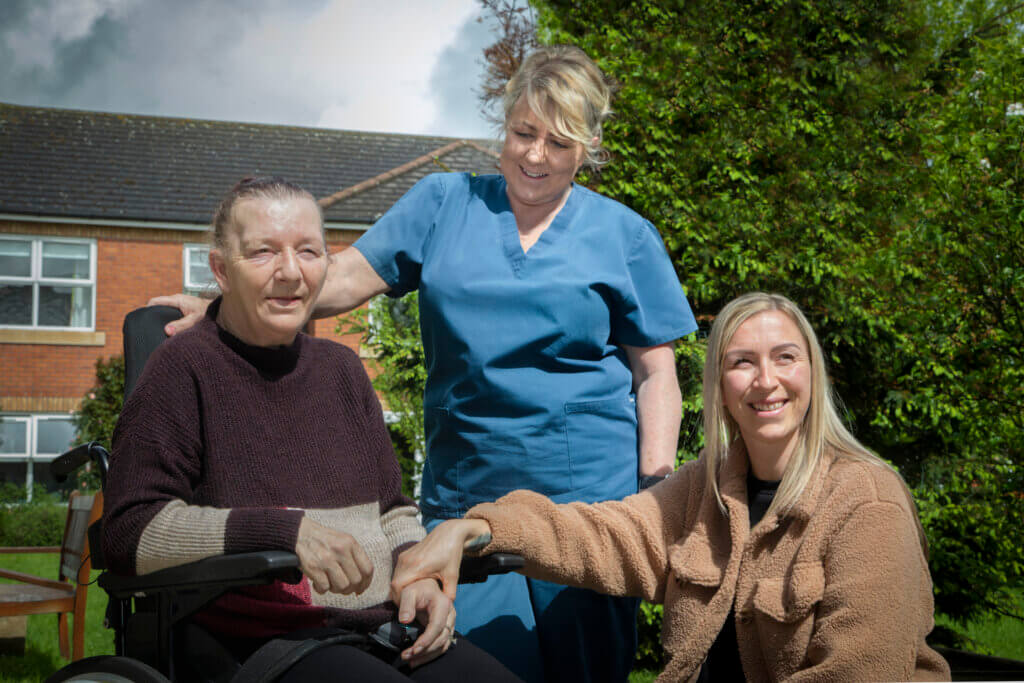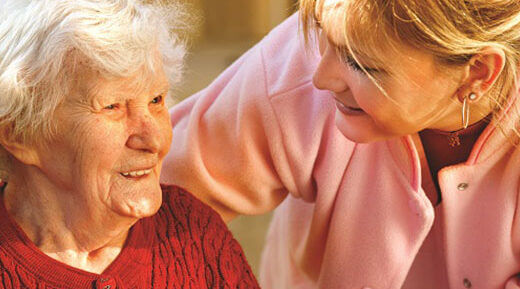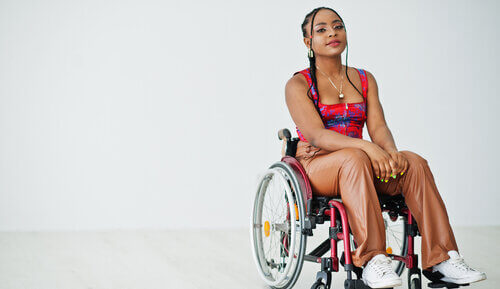
Page contents
- What is Huntington's Disease?
- What causes Huntington’s Disease?
- How do I know if I carry the faulty gene?
- What are the symptoms of Huntington’s?
- Huntington’s Disease Symptoms
- When do symptoms of Huntington's develop?
- Is there a cure for Huntington’s Disease?
- Is there a Huntington’s Disease treatment?
- What’s it like to have a family member with Huntington’s?
- Katie’s story
Page contents
- What is Huntington's Disease?
- What causes Huntington’s Disease?
- How do I know if I carry the faulty gene?
- What are the symptoms of Huntington’s?
- Huntington’s Disease Symptoms
- When do symptoms of Huntington's develop?
- Is there a cure for Huntington’s Disease?
- Is there a Huntington’s Disease treatment?
- What’s it like to have a family member with Huntington’s?
- Katie’s story
What is Huntington’s Disease?
Huntington’s Disease is an inherited brain disorder in which cells in certain areas of the brain break down. There are a number of Huntington’s symptoms.
A faulty gene produces a toxic protein called Mutant Huntington. The protein slowly poisons specific groups of brain cells, leading to gradual dysfunction and decline in motor skills, cognitive abilities and behaviour.
It affects your body’s central nervous system – the network of nerve tissues in the brain and spinal cord that co-ordinate the body. The condition causes involuntary muscle movements and changes in the brain leading to changes in behaviour including an inability to control emotions.
The disease ultimately leads to patients needing 24 hour nursing care and is fatal.
What causes Huntington’s Disease?
Huntington’s Disease is an illness caused by a faulty gene in your DNA. The condition is inherited.
Every child conceived naturally to a parent who carries the Huntington’s gene has a 50% chance of inheriting it.
The faulty gene produces a toxic protein called mutant Huntington. Mutant Huntington protein slowly poisons specific groups of brain cells, leading to gradual dysfunction and decline in motor skills, cognitive abilities and behaviour over a period of 20 years. The disease ultimately leads to patients needing 24 hour nursing care and is fatal.
It is estimated that around 7,000 people in the UK have the disease and men and women are affected equally. There is currently no cure and no way of preventing it from progressing.
How do I know if I carry the faulty gene?
- A genetic test can find out if you have the faulty gene.
- Blood tests confirm whether you have the condition.
- Pregnant women can get themselves checked, if they know of anyone in their family with the Huntington gene. If a woman gets pregnant with condition, she can have the foetus tested for the faulty gene.
What are the symptoms of Huntington’s?
The Huntington’s disease symptoms can vary between people.
The condition commonly affects:
- Physical movement – Movements can happen that you don’t expect, meanwhile movements that you want to do become more difficult.
- Cognition – This can cause difficulty in thinking and planning.
- Emotions – Behaviour and personality changes including an inability to control emotions, such as mood swings and challenging behaviour.
Huntington’s Disease Symptoms
Early Huntington’s symptoms may include:
- Slight, uncontrollable muscular movements.
- Involuntary movements. This is called chorea.
- Difficulty making movements you want to make.
- Stumbling.
- Clumsiness.
- Activities take longer to complete.
- Lack of concentration.
- Short-term memory lapses and forgetfulness.
- Changes in behaviour, mood and personality.
- Difficulty organising and planning.
- Difficulty dealing with new situations.
- Depression. The psychological impact of the disease can affect a person’s wellbeing.
- Being angry, irritable or frustrated.
Medium stage to late-stage symptoms of Huntington’s may include:
- Muscles make involuntary contractions. Muscles are stiff and rigid.
- Movements slow down. Arms and legs may become clumsy.
- Changes in speech. Forming words is difficult.
- Difficulty swallowing.
- Problems eating.
- Difficulties with weight loss and nutrition.
When do symptoms of Huntington’s develop?
You can live with the faulty ‘Huntington gene’ for years without symptoms, but at some stage you will develop symptoms.
Doctors cannot determine when symptoms will develop.
Symptoms commonly develop between the ages of 30 and 50. If you develop symptoms before the age of 20, this is known as Juvenile Huntington’s disease.
One mum said her daughter developed Huntington’s when she was 16. It began with depression and hiding in the toilets at school. Her physical problems came on very rapidly until she couldn’t walk, talk and is peg fed through her tummy as she can’t swallow.
Describing it as “Parkinson’s, Motor Neurone Disease and Alzheimer’s all rolled into one devastating condition”, one mother told homecare.co.uk: “I would never want to put any child through what I have had to watch and endure my children have to go through and deal with.”
Is there a cure for Huntington’s Disease?
There is no cure for the condition and there is no way of preventing the condition from getting worse.
If you have the condition, you can manage your symptoms more effectively to improve your quality of life. Treatment and support can help reduce some of the health issues caused by the condition.
Is there a Huntington’s Disease treatment?
The specific symptoms of the condition can be treated. NHS support is available at Huntington’s Disease clinics.
Here are some examples of treatments for symptoms of the disease.
Genetic counselling
You can ask your GP to refer you to a genetic counsellor to help you consider what the test means for you and your family.
Physiotherapy
Physiotherapy can help you with movement and balance. This can involve specific exercises, massage and help manipulating joints by moving and stretching them.
Speech and language therapy
Speech and language therapy can help you if you are finding it hard to form words. This therapy can find alternative communication methods like picture charts, electronic speech equipment.
Medicine
Medication e.g. to treat depression arising from living with the condition, anti-depressants can be given. Other medicine can be provided for mood swings.
Dietician
A dietician can help you maintain your weight if you are struggling to eat.
Occupational Therapy
Occupational therapy can make daily tasks easier. They may suggest ramps are installed at home to help those using a wheelchair. A stairlift, grab rails and voice-controlled devices for lights etc are other useful home care aids.
Home care
- You can receive care and support in your own home to live as independently as possible while managing your symptoms. Home care support can include help showering, getting out of bed, getting dressed, going to the toilet, meal preparation, assistance eating, assistance to attend appointments etc. Live-in care is also provided by many home care providers across the UK. You can search for home care providers on homecare.co.uk.
Care home
- Care homes with the training and experience to care for people with the condition are operating across the UK if you need 24 hour care. You can search for a care home on carehome.co.uk.
- Huntington’s Disease Association’s Specialist Huntington’s Disease Advisory service for England and Wales.
- Huntington’s Disease Association support groups help people talk to others who are also struggling with the impact of this debilitating disease on themselves or their loved ones.
What’s it like to have a family member with Huntington’s?
Katie’s story
Katie Davies aged 36 has decided not to have children of her own after three generations of family were killed by Huntington’s Disease.
Ms Davies, who lives near Wrexham, made the decision not to have any children after watching her mum and aunt die of the hereditary condition.
Many people at risk of Huntington’s Disease decide they’d rather not know if they have the faulty Huntington’s gene until symptoms of the disease appear.
Katie decided not to have kids and ‘lived in constant fear’ of Huntington’s
Katie does not know if she has inherited Huntington’s Disease from her mother and she has decided not to take a test to find out if she is carrying the faulty gene.
She has decided not to have children so that there is no danger of her passing it on to descendants.
Katie Davies said: “At the moment I do not know if I will get Huntington’s or not. It is something I have thought long and hard about but for now I have chosen not to be tested.
“For years I lived in constant fear that I might be next, until I was referred for counselling to help me with my mental wellbeing and stop thoughts of the disease taking over my whole life. Now I just live my life each day as it comes and enjoy time with[husband] Sion and our family.”

Katie has lived under the shadow of the disease all her life.
For eight years, Katie’s mum Fiona Jones, aged 59, has been living at Pendine Park’s Pen-y-Bryn care home in Wrexham.
Fiona and her twin sister Alison knew in younger years that they had a 50-50 chance of inheriting Huntington’s from Katie’s grandfather who also died of it, as did her great grandfather.
Alison also had the disease. Alison’s illness progressed at a quicker rate than Fiona’s, in its early stages.
Cheerful matriarch’s ‘wild mood swings and strange fixations’
Fiona first spotted the early symptoms of the condition in her twin Alison, even though she was not symptomatic herself. Fiona noticed how her sister would struggle to find the right words sometimes and was prone to stumbling and strange jerky movements.
When Fiona herself began having symptoms, she would shake physically and mentally.
Shortly after Alison’s symptoms became evident in her mid to late thirties, Katie’s mum began experiencing the effects of the progressive debilitating illness.
Alison died in 2020 after spending her final years at Pen-y-Bryn care home, where Fiona lives.
Katie says her mum changed from a bright, cheerful matriarch of the family with four children into a struggling, stumbling person with “wild mood swings and strange fixations”.
Katie took on the role of mum to her younger brother and sister, Ted and Kia who moved in with her and her husband Sion.
Katie’s mum Fiona is one of the people living with the condition and being cared for at Pen-y-Bryn care home.
The care home has just been recommended to become a fully accredited Huntington’s Disease care centre.
The care home in Wrexham cares for younger people with neurological problems caused by acquired brain injury and conditions such as Multiple Sclerosis and stroke. It is considered a centre of excellence in caring for people with Huntington’s.
Tracey Cuthill manager of Pen-y-Bryn care home in Wrexham said: “We are proud to be considered as a centre of excellence by families and medical professionals.
“There is no doubt Huntington’s is a terrible disease. It’s vital we raise awareness of the disease and how it manifests itself.”


